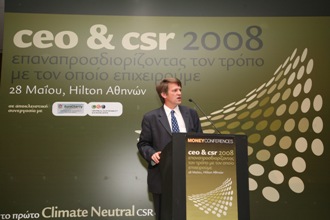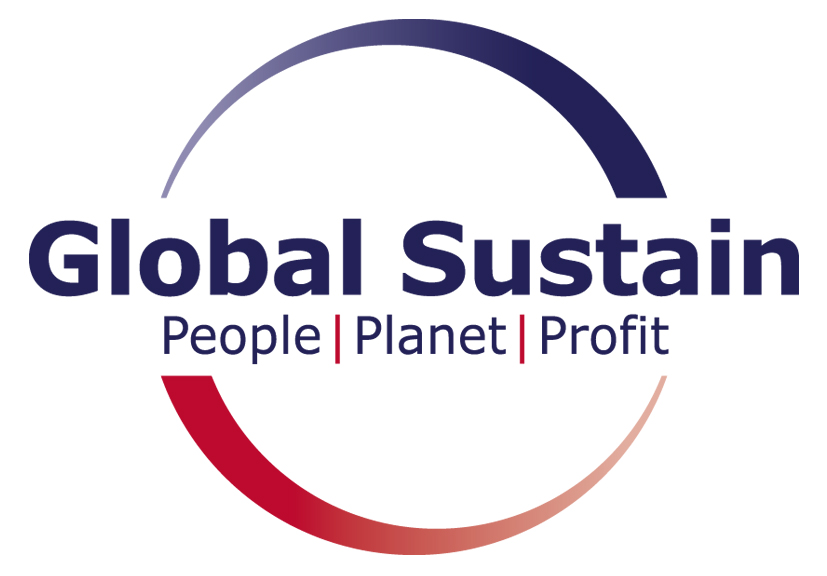Deputy Chief of Mission Thomas M. Countryman's speech to the CEO & CSR Conference 2008 in Athens, May 28, 2008
Published 06-03-08
Submitted by Global Sustain Limited (Ltd.)

ATHENS,GREECE, - June 3, 2008 - Thank you, and good afternoon. Distinguished guests, ladies and gentlemen, I am pleased to join EuroCharity once again, following a series of presentations on topics which I consider to be of utmost importance. You have heard about the steps that individual companies and organisations are taking to make a difference, and the importance of promoting innovation in order to change the way we think and act. I would also like to tell you a bit about what the United States is doing, including steps we are taking at our Embassy in Athens. As this afternoon's discussions focused on climate change,
I will begin there.
Climate Change
While many people do not know the details, the United States is actually very active on addressing climate change and helping the environment. People often lose track of the considerable progress we are making, and are unaware of the fact that we continue to out-perform Kyoto member countries. In fact, the growth in U.S. emissions has slowed considerably since the 1990's. Between 2000 and 2005, the latest period for which we have comparable UN data, the U.S. and the EU-25 experienced roughly the same rate of growth in emissions -- about 1.5% or 1.6%. To put this in perspective, however, let me note that during that same period the U.S. economy and population both grew at approximately twice the rate of the EU. More recently, in 2006, U.S. emissions actually declined. The 2007 U.S. energy law mandated targets that are on a par with the emissions to be cut under the Kyoto Protocol.
Last month, President Bush announced a new national goal to stop U.S. greenhouse gas emission growth by 2025. The centerpiece of our strategy is in setting high, but realistic goals. We believe that it is essential for other nations to do the same, because as promising as our new initiatives are, U.S. action cannot stand alone. Even if we reduced our emissions to zero tomorrow, we would not make a meaningful dent in reducing growth in carbon emissions without the concerted action of all major economies.
Already, experts believe that emissions in China have surpassed those of the United States. That is why we believe that effective global efforts to combat climate change must include the developing world. This is the foundation of our ongoing efforts to address climate change via the Major Economies process. This process aims to help countries in the developing world gain access to the technologies, and financing that will enable them to take a lower carbon path to economic growth. At the Major Economies leaders' meeting that will be held in conjunction with the G-8 summit in July, we will seek agreement on a long-term global goal for emissions reductions, as well as agreement on how national plans will be part of the post-2012 approach.
This approach must be environmentally-effective and economically sustainable. To be effective, this approach will require commitments by all major economies to slow, stop, and eventually reverse the growth of greenhouse gas emissions. To be economically sustainable, this approach must foster the economic growth necessary to pay for investments in new technology and to raise living standards. Rather than drastic emissions cuts that have no chance of being realised and have every chance of hurting national economies, we believe in setting realistic goals consistent with advances in technology, while increasing our energy security and ensuring that our economy can continue to prosper and grow.
U.S. Actions
As this morning's keynote speaker, Dr. Braungart's noted -- "being less bad is not being good." I would like to say that the primary reason that we are no longer the world's top emitter is due to a dramatic reduction in our carbon emission levels, rather than to China's numbers rising. Such a reduction is, however, our goal which we aim to achieve through promoting innovation and development at both the federal and state levels.
Our advances have come primarily through the application of market-based, high-technology solutions to power generation and increasing fleet efficiency in transportation. At the federal level, a recent report by our Department of Energy outlines steps which would allow us to produce 20% of all U.S. electricity via wind energy by 2030. If we are able to achieve these goals, we would avoid the accumulation of 7.6 gigatons of CO2. Already, I am proud to say, existing wind energy facilities produce enough electricity to serve 2.9 million American homes and displace approximately 23 million tons of carbon dioxide -- the leading greenhouse gas -- each year.
As Dr. Braungart also indicated this morning, the answers cannot always come from the Government. What our Government can do, however is continue to promote private investment. At the State level, many of you are at least vaguely familiar with the strong efforts in California, but states such as Texas are also very active in pressing environmentally-sound solutions. A recently announced public-private initiative for wind energy in Texas already lists more than USD 10 billion in committed investments for new wind projects.
U.S.-Greek Efforts
Our efforts in encouraging private investment does not stop in the U.S. though. Greece and the United States, in fact, have been building collaboration efforts in the field of renewable energy right here in South-East Europe. Over the course of the past six months, the U.S. Agency for International Development (USAID) has worked closely with Hellenic Aid to assess ways in which we can increase energy efficiency and the use of renewable energy in the Balkans. This past Friday, Secretary General Skylakakis, of the Ministry of Foreign Affairs, and USAID Deputy Assistant Administrator Mefford signed a Memorandum of Understanding which solidifies these efforts. Within the coming year, we hope to establish specific projects ranging from improving energy efficiency in different types of buildings to providing advice on building the capacity of governmental renewable energy bodies.
Green Embassy
Looking closer still, let me tell you about what we are working on at our Embassy. I'm very proud of it. In March, Ambassador Speckhard signed our Embassy into the League of Green U.S. Embassies. Already twenty-two U.S. Embassies and diplomatic missions in Europe, including ours, have joined the league. In joining, the missions signed a commitment to take concrete steps to increase energy efficiency at each of their properties; and adopt other environmentally responsible practices, including targeting our Embassy vehicle fleet. Furthermore, these Embassies are working together to advance our initiatives and gain support in Washington.
Our Embassy specifically has started what we call the "Green Embassy Initiative," which aims to drastically reduce our net energy consumption. We are reviewing energy consumption data for our official buildings and our individual residences in an effort to first raise awareness, and then work together to reduce our "footprint."
Additionally, the most ambitious component of this initiative so far investigates the installation of photovoltaic panels on the rooftops of our buildings. We are currently working to install 100kW of these panels at the Embassy in the near future, and are working with Washington to approve a larger program as soon as possible. We applaud the Greek Government for its focus on renewable energy initiatives, and given the location of the Embassy, hope our project stands as a strong and visible symbol of support for these initiatives in the future. We are excited to explore this ground-breaking project, in hopes that it will also motivate local companies to use alternative forms of energy. The fact is, preserving the environment is the moral responsibility of each and every one of us. Advancing policy initiatives accomplishes little if we are unable to live in practice of these same goals. My Embassy is taking that responsibility seriously and I hope our efforts will pay off and encourage others to do the same.
Conclusion
Working at the U.S. Embassy, I'm sure you can imagine that it isn't unheard of for people to question, even jokingly, at a hidden agenda for some of our actions. In regards to climate change and efforts to "go green," I imagine that many of you have faced similar questions. This morning, I heard that there is even a term for it now -- "Green Washing." A few months ago, an article in the Financial Times commented on the Harvard Business Review's "Conversation Starter" blog in relation to CSR. The article noted that many bloggers wrote that Corporate Social Responsibility was only a "public relations sham" and that all such efforts are self serving. Certainly, "Green Washing" exists. In contrast to these "bloggers" -- I think we have seen today that cradle-to-cradle approach, and CSR in general, is indeed on the rise. It has the potential not only to support better business practices but to increase economic transparency and efficiency.
At EuroCharity's CEO and CSR conference last fall, I spoke about the evolution of government's and business's approach to CSR. More specifically, I said that the smart country and corporation is the one which recognises that social, cultural, environmental and historical sensibilities can affect a nation's prosperity and an international corporation's bottom line. Our future is inextricably linked to the choices we make today. The cradle-to-cradle concept is not only good business sense, it is simply good sense. In a world of budgets and financial limitations, however, it is refreshing to be able to fall back on the business sense to encourage others to rethink how we go about our daily business. I would like to thank the conference organisers, today's speakers and panelists, and the efforts of those of you here today, and others like you, who seek ways to optimise and refine day to day practices and business in ways that improve the world around us.

Global Sustain Limited (Ltd.)
Global Sustain Limited (Ltd.)
About Global Sustain
Founded in 2006, Global Sustain with offices in Athens, Berlin, Brussels, London, New York and Nicosia, creates awareness and inspires and supports companies and organisations to embody sustainability, through advisory, communications, networking and training, with a focus on the people-planet-profit philosophy. Its members include corporations, non-governmental and non-profit organisations, municipalities and local authorities, educational foundations, media, professional bodies, think tanks and other public or private entities. Global Sustain is a signatory to the Ten Principles of the UN Global Compact, to the Principles for Responsible Investment (PRI), a GRI Data Partner and Organisational Stakeholder (OS), an affiliated member of the Academy of Business in Society, Social Value International, Institute of Directors, CEO Clubs and EFQM. www.globalsustain.org / www.globalsustaingroup.com
More from Global Sustain Limited (Ltd.)

